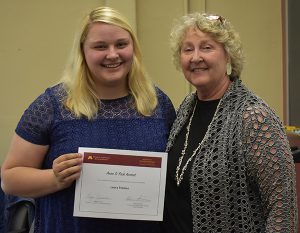
Each year, the Institute of Child Development (ICD) grants one undergraduate child psychology student with the Anne D. Pick Award for an Outstanding Child Psychology Major. The award honors Professor Anne Pick’s commitment to early childhood education. Students chosen for the award demonstrate excellence in both research and academics.
This year’s recipient is Laura Thomas, who focuses her research on eye tracking and MRI scans on infants. Thomas currently works with ICD Assistant Professor Jed Elison, Ph.D., in the Elison Lab for Developmental Brain and Behavior Research (ELAB). More recently, Thomas conducted research specifically on the amygdala, which is an area of the brain affected in adults with autism.
With the award, Thomas will receive a scholarship of $500 and up to $250 in travel/research funds. Below, Thomas shares more about her research and her experience in ICD.
What made you want to study child psychology or early childhood?
I actually decided to come to the U of M because of their reputation as one of the best developmental psychology programs for undergraduates and graduates in the nation. Working with and supporting children is something I have always wanted to do, I didn’t know my interests fell in psychology until taking an AP psych class in high school and being absolutely amazed at all the mysteries behind the brain. So finding a school that offered child psych as a major seemed like the perfect fit.
What kind of research are you involved in?
I have worked in Dr. Jed Elison’s lab (ELAB) since my freshman year. Within his lab I focus mainly on eye tracking and MRI scans on infants. I just finished my honors thesis, which was funded by the Autism Science Foundation. My research focuses specifically on the amygdala, an area of the brain known to be affected in adults with autism. My project studied the function of the amygdala during an eye tracking attention task in 145 toddlers to help better determine the biological basis of attention problems in young children – problems that may be responsive to early treatment.
What do you find most interesting about child development?
All of the mysteries surrounding the field! There will never be a lack of questions to ask and to me that is so fascinating. There is always more to learn. I am especially interested in social development and perceptual development in infants.
What are your plans for after graduation?
Great question! I plan on taking a year (or two) off to further narrow down what I would like to do. I will definitely be headed to graduate school. What kind of graduate school is still a mystery to me. Because of that, I want to keep my options open. I eventually do want to get my Ph.D. as well. That has always been a goal of mine.
How would you describe your experience at ICD?
My experience has been extremely worthwhile. I have been given opportunities that not many people my age get. I mean, what 21/22 year old can say they ran their own study start to finish? That’s pretty cool in my opinion. My education within ICD has been incredible too, I have been taught by some of the leading researchers in the field of developmental psychology and I have been exposed to cutting edge research. ICD has fully prepared me for the “real-world” and provided me with ample opportunities to have a successful career within the field of child psychology.



